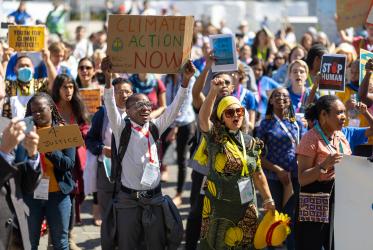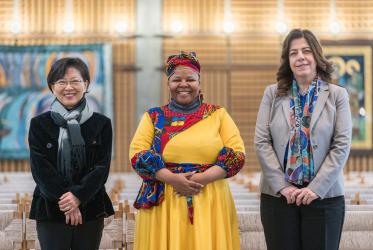Do Kamo is a holistic philosophy that encompasses spiritual, social, and ecological proportions of life. As deeply connected to the ancestor and their cultural values, it summarizes the idea of living in balance with the natural world, nature and one’s community. It reflects a deep spiritual connection to the environment and the belief that maintaining this balance is essential for the wellbeing and security of the community.
As we reflect on the gift of the faith of our Kanak people, we hear their call to us in our rich Pasifika diversity to seek transformation of ourselves and of our world.
Healing the brokenhearted
Jesus’ ministry was marked by compassion and healing, providing solace to those suffering physically and spiritually. Following in Jesus’ footsteps, we’re tasked with reaching out to the those who need physical, emotional, mental, and spiritual healing, and to the marginalized.
Proclaiming liberty
Through His teachings and actions, Jesus set free those bound by sin and societal constraints. In a world rife with inequality, Christians are urged to fight for justice and righteousness.
Recovery of sight
Not only did He restore physical sight to the blind, but Jesus also opened the spiritual eyes of His followers. This act of spiritual liberation is part of the process of decolonisation that also leads our people to reclaiming the power of their culture, Indigenous knowledge, and wisdom.
Pacific churches are speaking truth and justice to power. As we continue to witness the enduring legitimation of extraction, we acknowledge that our communities have been turned into marketplaces which need transformation by engaging those colonizing legions which prevent the transformation of our people into their authentic selves in Christ, through the hyper militarization known as the Indo-Pacific strategy, and the Australian, UK, US–AUKUS Pact that inserts a so-called security lens into climate justice, development, trade, and aid.
We are seeing aid, development, political policies, trade agreements, even climate security—all being driven by the Indo-Pacific strategy. Our sisters and brothers in Tuvalu can tell you how they feel about the agreement signed last year by their former government and Australia which offers permanent residency to up to 280 Tuvaluan citizens a year affected by the climate crisis, and includes a security clause that in effect gives Australia veto power on Tuvalu entering into security agreements with others – which means they have had to basically hand their sovereignty to another country as a result of both climate change and the Indo-Pacific strategy.
France has been using the threat of China to argue that Kanaky and Maohi must remain part of France for the security of the whole region – as they renew military alliances with Pacific countries using the bribe of funding for development.
Last week Papua New Guinea renewed a military alliance with Indonesia as part of the Indo-Pacific strategy that puts Papua New Guinea as the gateway to Asia and on an arc that reaches to US bases in the Marshall Islands, Federated States of Micronesia, and Guam. This will no doubt have implications on the West Papuan struggle for human rights, dignity, and self-determination.
Maohi Nui-French Polynesia, the Marshall Islands, and Kiribati continue to struggle for justice for the 277 nuclear bomb detonations that took place between 1946 and 1996.
The Pacific is the final frontier where we see a scramble to control the Pacific Ocean and its natural resources.
We seek to raise the prophetic voice of the church; engage in pastoral care, accompaniment, and risky solidarity; and ensure that there are practical outcomes of our work.
May God guide us in our work for Metanoia that begins in our lives, and our churches, and spreads across our common home.





